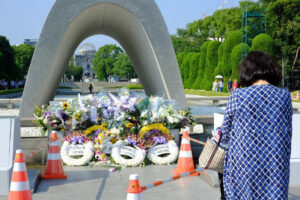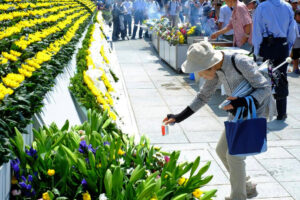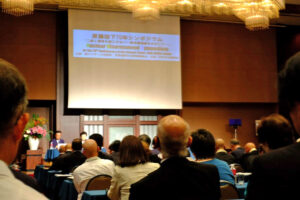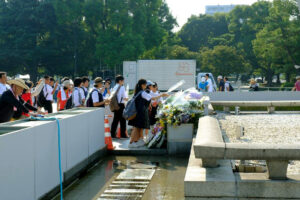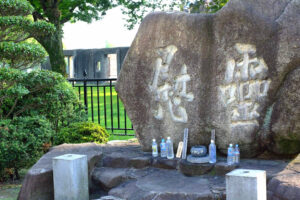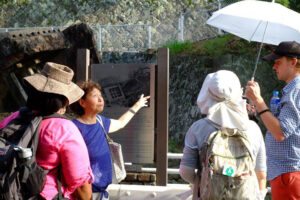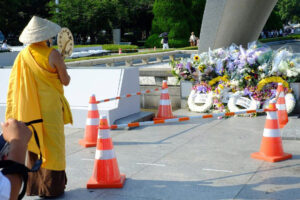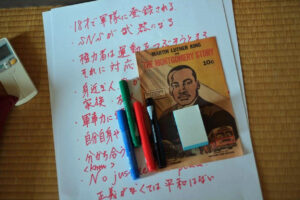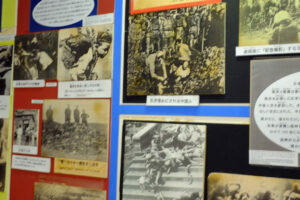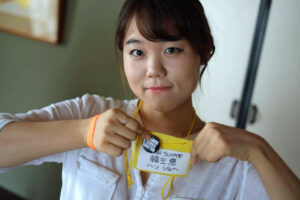by Kyoko Iitaka, Ph.D.
Aug. 8, 2020
Dear friends in FOR-USA:
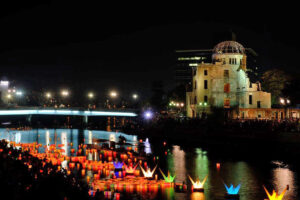
On the occasion of 75th Hiroshima and Nagasaki memorial days, we would like to send our message of friendship and solidarity. We hope that we can work together to abolish nuclear weapons for the whole world. You might recall that the International Campaign to Abolish Nuclear Weapons (ICAN) was awarded the Nobel Peace Prize in 2017 for their efforts to unite 468 organizations from 101 countries to eliminate nuclear weapons. Their proposal was adopted by the U.N. General Assembly in October 2017 and the Nobel Peace Prize two months later, in December.
In 1967, the Treaty of the Non-Proliferation of Nuclear Weapons (NPT) was drafted to enforce the prohibition of the development, experimentation, manufacturing, stocking, transfer use, and threatening use of nuclear weapons and their elimination. This treaty came into effect in 1970 as a means to legally confirm that a state does not possess nuclear weapons. However, the NPT prohibits nuclear possession except in the countries that manufactured and exploded nuclear weapons before January 1987; i.e. the United States, USSR, United Kingdom, France, and China. In addition, three countries have since developed nuclear weapons without participating in the NPT: India and Pakistan have acknowledged they possess nuclear weapons, and Israel, which has never officially declared possessing nuclear weapons. North Korea and Iran have proceeded to develop nuclear weapons while being signatories of the NPT (North Korea withdrew from the treaty in 2003). Unfortunately, the NPT does not impose abolition of nuclear weapons and can be interpreted as a treaty permitting the possession of nuclear weapons indefinitely.
The world is divided into a few nuclear-weapon states, and the rest, many non-nuclear-weapon states who could be targets of the nuclear attack if and when the political leaders decide to use that inhuman weapons against the others whom they dislike. Thus, the ICAN movement had tried to ban the nuclear weapons via U.N. international law through a campaign to create a legally binding agreement that would strengthen the NPT, known as the Treaty on the Prohibition of Nuclear Weapons (TPNW).
In order to have this TPNW law become effective, fifty nations must ratify it. Just this summer, since the start of July, six more nations have ratified the TPNW (Botswana, Fiji, Ireland, Nigeria, Niue, and Saint Kitts & Nevis), making a total of 44 official signatories and meaning only six more must sign for the treaty to have it come into effect. Among those who have not ratified are the USA, Russia, U.K., China, France, India, Pakistan, Israel, North Korea, Iran, and Japan.
As members of the International Fellowship of Reconciliation (IFOR), we must earnestly appeal to each of our governments to ratify the treaty to ban the nuclear weapons. I am ashamed to say that Japan, which had been targeted by these nuclear weapons in Hiroshima and Nagasaki 75 years ago, should have ratified this treaty right away. However, she has not taken that step. Japanese Prime Minister Shinzo Abe and his cabinet want to stay under the “umbrella of nuclear power” by the United States.
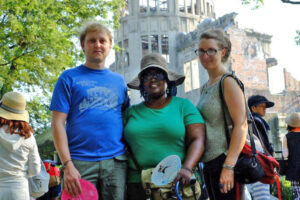
A-bomb survivors have been telling us to stop being competitive, violent enemies and start being cooperative, nonviolent human partners on earth with all other living plants and animals. To our sorrow, we have been making our earth unlivable by climate warming, which has brought about recent drought, forest fire, and heavy rain with floods. We have driven birds, insects, and animals away from their nests by recklessly cutting down trees in the forests and developing land out of marsh to make our lives wealthier and more comfortable. As a result, all of these human-made factors have certainly contributed to the global pandemic of COVID-19.
Now, IFOR members have the opportunity to confirm that we should not rely on nuclear arms or any other weapons, all of which require a huge investment of our taxes, which could have instead met urgent needs of people such as poor public health, little food, and no safe place to live. We need to make clear that the concept of building a “Permanent Peace” based on the nuclear power balance among nations is impossible, and that this might in fact TERMINATE OUR HUMAN SOCIETY!
As for Japan, the Security Treaty between the United States and Japan has continued to be in effect since 1960. This Treaty supersedes the Japanese Constitution regarding the human rights of Okinawa people. The location of Okinawa, with its access to China, Taiwan, and even the Korean peninsula, is similar to that of Sicily (where IFOR’s 2018 Quadrennial Council was held), which is proximate to North Africa. Okinawans, as well as some of us from the mainland, have nonviolently resisted the concentration of U.S. military bases, but have often been treated violently by the US and Japanese police forces. Some of our friends had been arrested and kept in jail for lengthy periods without justifiable reasons. In spite of this unjust treatment, Okinawans do not use violent resistance, drawing on the teachings of the late Shoko Ahagon(1901-2002), called the Gandhi of Okinawa.
I was moved in reading the background of the late John Lewis, who died July 17, for his leadership in the civil right movement based on nonviolent principles, even when he was threatened with death. I have learned that John Lewis, Dr. Martin Luther King, Jr. and Shoko Ahagon, were all FOR members and had studied the teachings of Gandhi.
Even in the face of oppression by U.S. occupation troops – who confiscated their homes and farmland on Ie Island, Okinawa prefecture, to use for an U.S. airbase – Ahagon told villagers not to hate the U.S. soldiers, arguing Japan had started the war. It was war, he said, that WE MUST AVOID. Opposing the construction of the military bases is because the U.S. bombers should not fly to the other countries to drop bombs to kill people living there. His influence has helped keep the Okinawa resistance movement nonviolent until today.
I would also like to highlight one of our special events held in partnership with the FOR-USA. In 2014, when we attended the IFOR Centennial, in Constanz, Germany, a young FOR-USA member, Issac Beachy, suggested that we hold a memorial worship service on August 6th for Hiroshima and Nagasaki.
FOR-USA delegates Isaac, Trina, and Samantha[/caption]Young FOR members from both the United States and Japan jointly prepared the program. All 16 participants in this memorial service signed a certificate as “Peace Security Agreement between Two Nations” as a clear contrast to the Security Treaty between the U.S. and Japanese governments. We prayed to bring about reconciliation and cooperation between our two nations. It was a memorable event for both FOR-USA and JFOR.
The following summer, in August 2015 (the same year that FOR-USA held its Centennial celebration) the Japan FOR invited U.S. young leaders to visit Japan on the 70th JFOR Anniversary of End of War Memorial Tour for Reconciliation between USA and Japan. The selected participants were Isaac Beachy (Pennsylvania), Imam La Trina Jackson (Georgia), and Rev. Samantha Lynne Wilson (California, now Arizona).
This trio of FOR-USA young representatives arrived in Japan on August 5th to be present in Hiroshima for the memorial service. Then they visited Nagasaki, Okinawa, Fukushima, JFOR’s annual meeting in Shizuoka, and finally back to Tokyo for the JFOR’s Farewell Report Meeting. Following a final stay at the Friends Center, they flew back home on August 23rd. This was a collaboration between our sister FOR branches: their roundtrip plane tickets were covered by FOR-USA and their in-country travel and expenses were supported by JFOR.
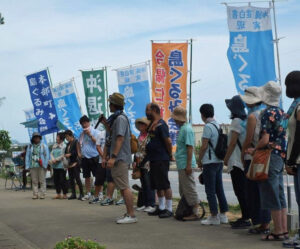
While in Okinawa, these young Americans witnessed the situation of how U.S. bases occupy the vast amount of that area. They also visited the Peace Memorial Center by Shoko Ahagon, who exemplified the indigenous nonviolent resistance movement. On our part, Japan FOR members learned about the Black Lives Matter movement that had been rising up across the United States. We all agree that that there is NO PEACE MOVEMENT WITHOUT SOCIAL JUSTICE.
Please forgive my long message and comments regarding the 75th memorial week for the nuclear weapons first used during World War II. We must never use those inhumane weapons again. Furthermore, we should not allow the use of any weapon to solve international conflicts. NO MORE WAR! This is OUR RESPONSIBILITY as members of the Fellowship of Reconciliation.
Kyoko Iitaka, Ph.D.
Former Chairperson, Japan FOR
IFOR Regional Consultative Committee member in Asia
[author] [author_image timthumb=’on’]https://forusa.org/wp-content/uploads/2020/08/Kyoko-Iitaka.jpg[/author_image] [author_info]Dr. Kyoko Iitaka is past chairperson of the Japan Fellowship of Reconciliation, a branch of the International Fellowship of Reconciliation. She continues to serves the global IFOR movement as a member in Asia of IFOR’s Regional Consultative Committee.[/author_info] [/author]
Some photographs from the FOR-USA delegation’s trip to Japan in August 2015. (Courtesy of Isaac Beachy)

